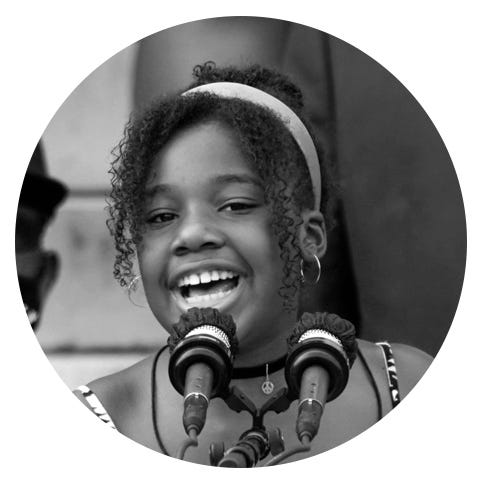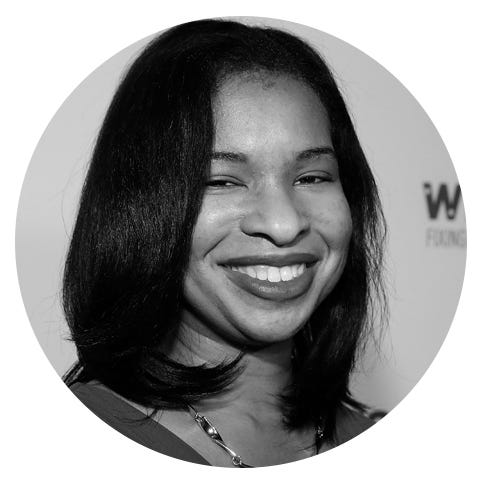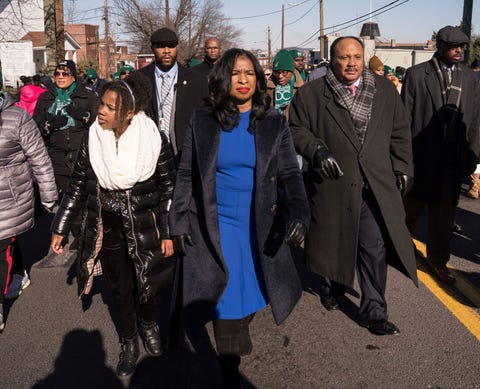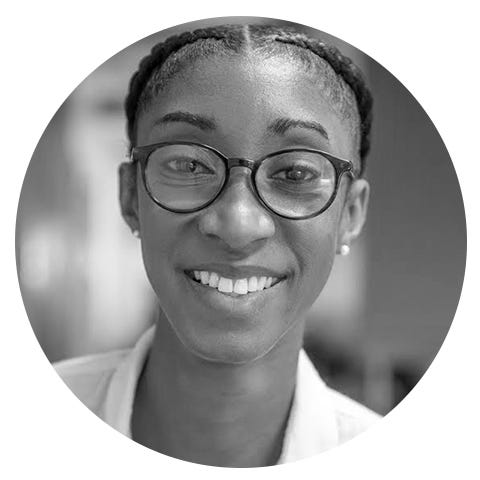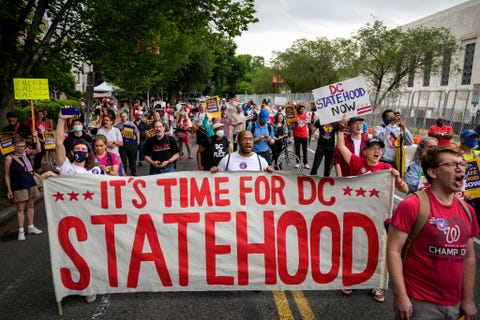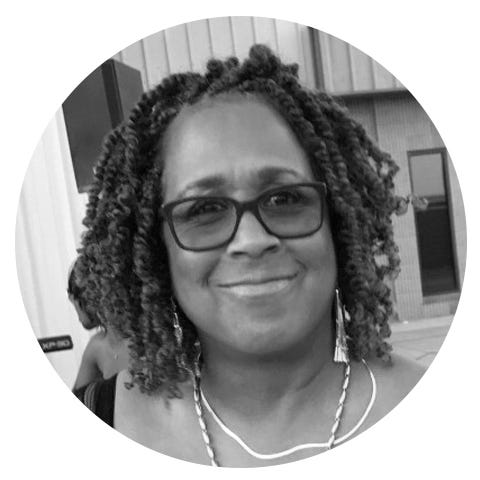Products You May Like
This Saturday marks the 58th anniversary of the March on Washington, where Martin Luther King Jr. delivered his celebrated “I Have a Dream” speech in front of the Lincoln Memorial. To honor the occasion, which became a catalyst for the Voting Rights Act of 1965, over 100 organizations will gather on the National Mall in Washington, D.C. and in cities across the country to show their support for voting rights and demonstrate against the most recent wave of voter suppression. This year, Republicans, claiming voter fraud, have restricted access to the polls following a historic election turnout in 2020, bolstered by Black and brown communities.
During that first march on August 28, 1963, Black women were not allowed to be at the forefront. In fact, they were forced to stage an entirely separate demonstration from men on Independence Avenue, despite the fact that they played critical roles organizing the day and were mainstays of the larger movement. This included women like Ella Baker, who helped Martin Luther King Jr. form the civil rights organization Southern Christian Leadership Conference and is now known as the Mother of the Civil Rights Movement, and Dorothy Height, another core organizer as president of the National Council of Negro Women. Ultimately, only one woman, Daisy Bates, was allowed to speak that day—she gave the 142-word “Tribute to Negro Women Fighters for Freedom” speech.
This time around, Black women are no longer satisfied with being organizers in the shadows of men and are taking their rightful place on the frontlines in this modern day civil rights fight. “We cannot be ignored,” says Arndrea King, wife of Martin Luther King III and one of the key organizers of Saturday’s march. “Black women, we’ve always been bold and unapologetic. We’ve always been the soul of the nation, of the movement. It’s our moment.”
Civil rights leaders are also using this anniversary to launch a new fight to protect voting rights. One of the core organizations leading Saturday’s march is the think tank and community action group Drum Major Institute, run by Martin Luther King III alongside his wife and founded by his late father in 1961. These leaders are calling on elected officials to eliminate the Jim Crow filibuster and pass three critical voting rights bills: the For the People Act, the John Lewis Voting Rights Advancement Act, and the Washington, D.C. Admission Act. They are especially calling on President Biden, who ran on the promise of having the Black community’s back, to end his inaction on the matter, echoing how Martin Luther King Jr. pushed President Lyndon B. Johnson during the height of the civil rights movement.
Arndrea King and other core leaders and activists have done essential organizing to center Black women’s voices in Saturday’s march and within the larger movement—underscoring how voter suppression laws will impact communities of color, especially Black women, who tend to be the backbone of those neighborhoods. “As women, we have always allowed ourselves to lean back,” says Andrea Pringle, political and strategic campaigns director for March On, another key organizer for Saturday’s march. “But historically, we have always been at the center.” Below, Pringle and the march’s other leaders discuss the impact of restrictive voting laws, Black womanhood at this moment, and the ongoing pursuit of equality and justice, in their own words.
Yolanda Renee King
activist & Martin Luther King Jr.’s granddaughter
“I believe this march can potentially change everything. This is how we put pressure on our leaders. This is how we show our politicians that we are committed. We’re not just saying we want voting rights; we are serious, and we will demonstrate that.
As a Black girl, it feels like my voice, my mom’s voice, and the voices of all the Black women in my life, have been silenced with this new restrictive Voting Rights Act. So on Saturday, we want to say, ‘We’re not just going to sit there and let you walk over our back.’ Then eventually, politicians will say, “With all the emails we’ve gotten, with all the demonstrations we’ve been seeing, they really want this [new] Voting Rights Act passed.” Then they’d work harder to get the bills passed. With pressure comes more commitment.
This march is also a way to motivate people. We want to get people rallied up. People can easily lose faith and get tired, but we can’t. In my grandfather’s ‘I Have a Dream’ speech, the most famous parts—where he started sharing his dream—happened because people were getting tired. So he went off-script; he had to rally them. And that motivated people. We want to uplift people and leave them with a heart, mind, and energy full of faith.
For many years, people have had this stereotype that whenever a Black woman or girl is strong or taking charge or speaking up, she is angry. But there’s a difference between being angry and strong. We should always stand up for ourselves. Those who want to silence us don’t want change. If you feel mistreated, speak up. If you feel silenced, speak up. Don’t let that thought of people calling Black women and girls angry stop you—don’t be a bystander in your own life. That’s something I think all Black girls should know, just how much power we have.
My grandmother once said that every generation has to earn their freedom. So my vision, my hope, is that the Gen Z generation is the generation that will gain freedom, not just for us, but for everyone.”
Arndrea Waters King
President, Drum Major Institute
“Black women are the answered prayers of our ancestors. We have been resilient activists fighting for those who can’t in our communities—fighting for equality and justice and for what is right. When I think about the Black mothers that have had to bury their children and carry the weight of the world on their shoulders, and they keep going—what strength that takes. We’ve always had a reserve within us.
Now, come Saturday and beyond, our job is to continue to stand for what we believe—to continue to put good pressure, or as John Lewis would say, getting in some good trouble to make our voices heard. We have to continue to hold our elected officials to their promises to us and their promises to democracy. That is our job.
We are in a fight for our democracy. Last year, we got out the vote. We organized communities, we did caravans, we did everything that we could think of, and people listened. Consequently, since January, several pieces of legislation have been proposed or passed in this country to restrict the right to vote. Those bills are calling for fewer drop boxes, limiting early voting access, limiting the amount of time you can wait in line, and closing polling locations in majority Black and brown communities, so there are longer lines. On top of that, certain legislation criminalizes the very act of giving out water in those long lines that these laws create.
All of that is the inevitable backlash of the tremendous movement we saw last year in voter turnout and the social awakening following George Floyd’s death. We also see that backlash with the attack on critical race theory and social justice teachings. That makes me—and a lot of Black women—more committed and more determined to roll up our sleeves and keep on keepin’ on. It is time for us to have laws that lift us all up, not limit us.
The drum major sermon was the last sermon Martin Luther King ever preached at Ebenezer Baptist Church. In that sermon, he talked about the importance of being a drum major for peace, a drum major for justice, a drum major for righteousness. And Martin’s mother loved that sermon so much that two months later, when he was assassinated and they were organizing his funeral, she insisted that the sermon be played. In that sense, he eulogized himself. At the Drum Major Institute, his pursuit is our call—we have to continue to build drum majors for peace, justice, and righteousness.
We want to—what I call—democratize the King legacy. Change is not housed in one individual or one family or one King legacy. We all are heirs to it; it belongs to all of us. It’s up to us to tap into our own place, our passions, our own power to create the beloved community. We see Aug. 28 as a kick-off to a renewed momentum until these laws are lifted and changed. This is not the end game. We will continue to organize and be on the streets and be up on Capitol Hill.
Next, we hope to register two million voters by the midterm elections. But even with registering voters, we have to have federal voter rights protection. That was the inheritance bought in blood from the civil rights movement—even going back to the women’s suffrage movement, back to when Black men were given the right to vote on paper 151 years ago. Too much is at stake in the future. Too much has happened for us to no longer have voting rights. Voting rights should be a birthright in this country.”
Stasha Rhodes
Campaign Director, 51 for 51
“As a Black woman, I am overjoyed to be a part of this movement as we fight for access to the ballot and representation in Congress for residents of Washington, D.C. Black women have always been a cornerstone in the fight for justice. Leaders like Coretta Scott King, Fannie Lou Hamer, Rosa Parks, and many more worked tirelessly without proper recognition and respect. I am keeping their journey and commitment at the forefront of this march. There are so many Black women today leading the fight for fair access to the ballot box, democratic representation in the Senate, and to unrig the rules that have oppressed Black and brown people in this country. And so I carry that legacy, like so many of the Black women joining us today, especially leaders like Arndrea King.
We are often overlooked. When you see workers and leaders, whether it’s civil rights, voting rights, LGBTQ+ rights, we are often last to be listed but the first to show up for the work. Constantly, Black women are left out of important conversations, even though they’re the ones that are leading and pushing the work in the background. And right now, we’re making our voices heard, because what we are pushing for and what we will accomplish will not only benefit Black women, but all of America.
It is important and urgent that President Biden pay attention to the Black and brown people traveling to Washington and marching all over this country on Saturday, urging him to be a strong leader in this voting rights fight. Folks are waiting to hear him be more vocal about this, specifically eliminating the filibuster. At this point, it is on us, on Black and brown people, to push to eliminate the filibuster and to pass all three of those bills. People stood in line for hours during the pandemic because they wanted a stronger democracy, and they believed President Biden would deliver. We’re all waiting to see what he does. We’re using this march for that reason. We want the White House to pay attention.
It wasn’t until Lyndon Johnson inserted his leadership as president of the country that we were able to get the Civil Rights Act of 1964 and the Voting Rights Act of 1965 passed—they had been filibustered for months. It took the leadership of the president then, and we’re looking for that same leadership right now.
Our coalition, 51 for 51, has worked with partners of the march to ensure that D.C. statehood is also a core point of Saturday’s demonstration. So often, when it’s a national conversation about voting rights, people lead with H.R. 1 and H.R. 4, and they leave out D.C. statehood. Too often, people travel to D.C. to march in favor of equality and justice without ever mentioning the most significant plight in our democracy: The fact that 700,000 people lack representation in Congress right here in Washington D.C. It’s impossible to fight for a stronger democracy and leave out the mostly Black and brown place that we call the seat of our democracy.”
Andrea “Andi” Pringle
Political and Strategic Campaigns Director, March On
“Black people made a calculated decision and decided that Biden was the better choice, the safer choice, the more certain choice. We mobilized around him, and now it’s time he remembers those promises he made.
What this last election proved is that Black people are the base of the party and progressive politics. If we are going to achieve the progressive changes we all believe in, we have to engage Black and brown people, and women in particular. We must give ourselves a voice and own our responsibility here. With that comes power.
Across America, and especially in the South, the people we elected to defend democracy are instead working to destroy it from the inside by passing laws based on a lie about voter fraud, which will disproportionately keep Black and brown Americans away from the ballot box or punish them with hours-long waits. We’re demanding that Congress pass the John Lewis Voting Rights Act and the For the People Act by any means necessary.
You often hear it said that Black women are the most important voting bloc in America, and that’s because we turn out. We know what it means to not have rights; we’ve heard from our mothers and grandmothers what it was like to live in the time of Jim Crow when you had to pay a poll tax to vote or got beaten just for standing up and asking for the same rights as white people in this country. We’ve experienced the trauma of racism every day. So we don’t take our rights for granted for a minute, and we will always stand up to fight for them.
Black women have always been here for democracy, and it’s time for democracy to be here for us. If Black women’s rights are being infringed on, that’s a red alert moment in our democracy, because it means every marginalized voice is in danger too.”
These interviews have been edited and condensed for clarity.
This content is created and maintained by a third party, and imported onto this page to help users provide their email addresses. You may be able to find more information about this and similar content at piano.io


